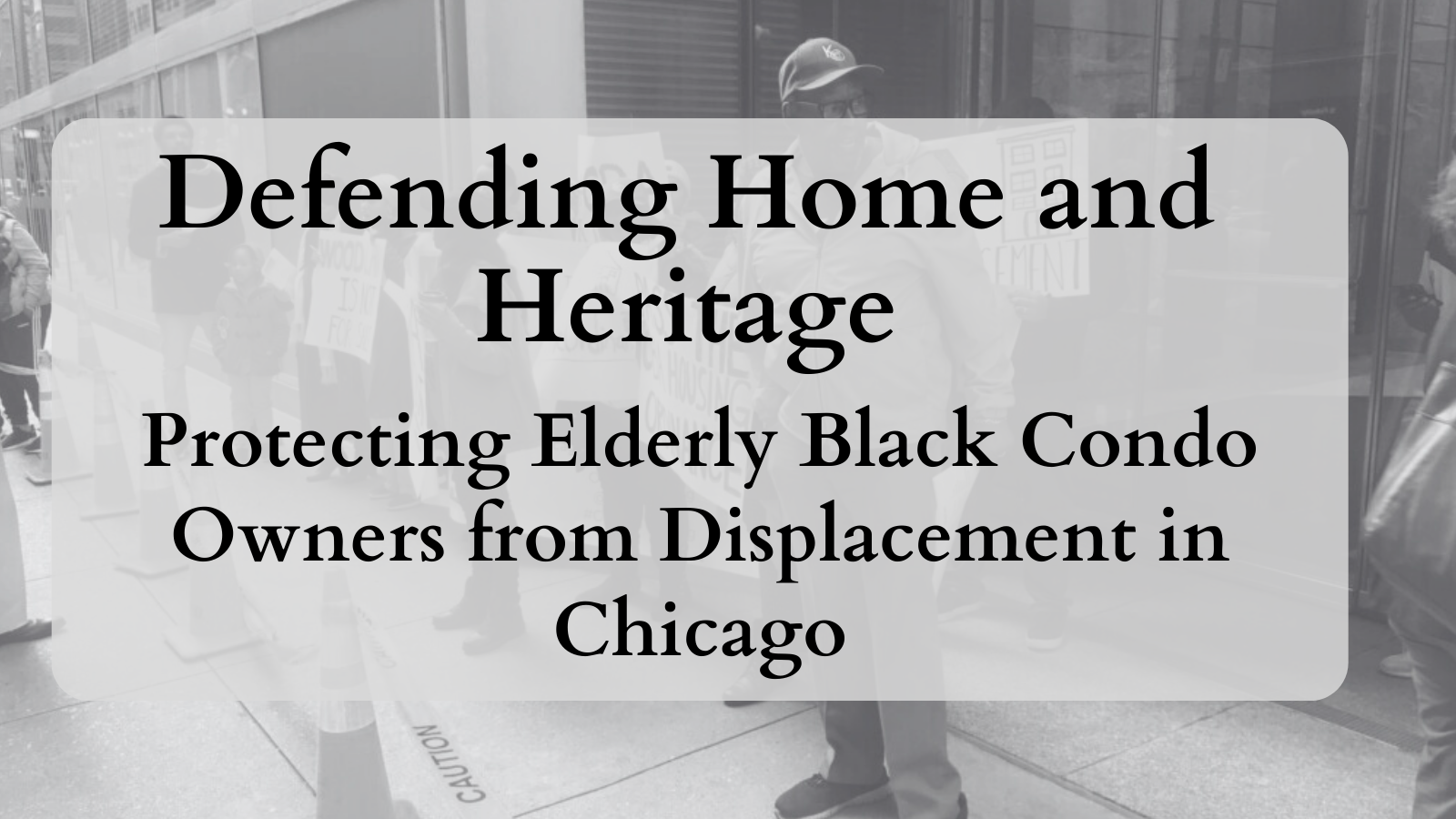47,000 Families to be Purged from Chicago Housing Authority Wait List
CHA’s 2014 Plan Reveals Lowest Level Of Rebuilding In History Of Plan For Transformation; Developer-Driven Redevelopment Slashes Housing Options For Thousands Of Low-Income Chicagoans
Download the Chicago Housing Initiative Press Release [PDF]
CHICAGO – In light of 47,000 individuals and families the Chicago Housing Authority plans to purge from its waiting list, revealed on page 36 of the recently released Chicago Housing Authority (CHA) Proposed FY2014 Moving to Work (MTW) Annual Plan, the Chicago Housing Initiative (CHI) issued a list of revisions to the proposed Plan at the CHA Public Comment Hearing. Community members and organizers cited concerns that the CHA 2014 MTW Plan continues a negative trajectory of slashing housing options for low-income Chicagoans, with a disproportionate affect on black people.
“Stalled redevelopment initiatives and persistent vacancies are the underlying cause of the wait list purge and a visible symptom of the negative impact the demolition and privatization model, which the 2014 MTW Plan will continue to employ, is having on thousands of families and individuals in Chicago,” said Roderick Wilson, Director of the Lugenia Burns Hope Center. “A lack of public accountability from the CHA has allowed unchecked diversions of millions in public resources from their intended use for housing low-income families. 2014 is a critical juncture in CHA and City planning that will affect more than 16,000 Chicago families in the coming years and CHA needs to use this opportunity to re-set its course and focus on producing the housing options the Agency is charged with providing. We urge the CHA to abandon its path of demolishing structurally sound buildings and selling off public land, and instead prioritize rehabilitation and preservation as cost-effective, time-tested methods of delivering housing at the needed scale.”Â
The CHI housing coalition highlighted that despite receiving millions in federal and city replacement housing grants annually, there has been no accountability or transparency for where these funds are actually going. However, the results of CHA’s current demolition and privatization model can be seen in such negative impacts as:
- Replacement public housing has slowed to a near halt with only 40 units projected for 2014 construction — the lowest level of planned rebuilding in the history of the Plan for Transformation.
- More than 13,000 Chicago families have been deprived of already-funded housing choice vouchers with no explanation.
- More than 47,000 families are scheduled to be purged from the CHA housing waiting list.
- 74% of replacement units delivered by CHA during the Plan have been brought back into occupancy through rehabilitation compared with only 12% from new construction following demolition.
“I am not the only person struggling today. There is a growing gap between real incomes and real rents which is putting the squeeze on more and more families in Chicago. Currently, a worker needs to make $18.11/ hour to afford the average two-bedroom in Chicago, and 16,000 CPS students experience homelessness annually, which makes it more important than ever that the Agency deliver on its commitment to provide low-rent housing options,” said Mary Nelson, CHA waiting list, homeless.
UNDERLYING ISSUES COMPROMISE EFFECTIVENESS OF 2014 MTW PLAN
In its analysis of the proposed 2014 MTW Plan, CHI identified three key, underlying issues compromising the effectiveness of CHA plans and sabotaging housing opportunities for low-income Chicago families:
No Plans To Increase Replacement Housing Production
Based on the Plan for Transformation initiated in 2000, CHA has a public commitment to produce 25,000 replacement public housing units by the close of 2015, the scheduled end of the Plan for Transformation. Prior to Mayor Emanuel taking office, the CHA constructed an average of 800 physical public housing replacement units annually. Yet while the Agency continues to receive around $40 million in “replacement housing factor grants” annually, funds ear-marked by the feds to support the construction or rehabilitation of replacement public housing, as well as millions in City Housing funds, the CHA has a greater than 50% failure rate producing promised replacement housing and has only delivered 2,580 replacement units via new construction over the past 13 years of the Plan for Transformation.
At CHA’s current replacement housing production rate, the CHA will need to request an extension of the Plan for Transformation to at least 2020– 5 years past the current end-date approved by HUD, and 10 years past the Plan’s original schedule for completion.
“Despite receiving millions in federal and city replacement housing grants annually, CHA plans to construct only 40 replacement public housing units in 2014— the lowest level of planned rebuilding in the history of the Plan for Transformation,” said Natalie Saffold, LeClaire Courts President with Right to Return. “At LeClaire, they made promises to rebuild 300 units before they tore our homes down and scattered our community; but today, nothing is there.”
Failure To Improve Performance & Efficiency Of Occupancy & Voucher Circulation
In 2014, 3,303 publicly-funded apartments will remain unoccupied even as CHA continues to receive full federal operating and capital subsidies for these apartments as if they were occupied (CHA will receive $20-$30 million in federal operating and capital grants on the basis of planned vacant apartments in 2014). CHA’s vacancy policy both reduces housing options and causes long-term damage to viable apartments, ultimately leading to avoidable demolition. The CHA describes 591 of these unoccupied apartments as vacancies and 2,712 apartments as “offline” (unavailable for occupancy) for a variety of redevelopment or modernization purposes.
On top of persistent vacancies in CHA’s public housing developments, the CHA’s 2014 Plan indicates the Agency also intends to hold funding it receives for 13,524 portable housing choice vouchers rather than circulate these housing choice vouchers to families on its waiting list, depriving 13,500-plus families of affordable housing. The CHA plans to only circulate, or lease, 38,675 of the 52,199 housing choice vouchers it receives federal funding for, holding the funding for 13,524 vouchers for other, unspecified purposes.
Coalition Questions Effectiveness & Parity Of Privatization Model
The CHA’s 2014 MTW Plan continues CHA’s historic trajectory toward demolition, privatization and developer-driven new construction versus viable and cost-effective alternative of rehabilitating remaining low-rise buildings and preserving them as publicly-owned and publicly-controlled resources — a proven strategy for creating more timely and affordable housing for constituent groups. CHA proposes the disposition (sale or long-term lease) of a sizable number of publicly-owned land parcels and/or public housing units to private developers where the proposed end-use of the land and housing is unclear.
“CHA redevelopment agreements to date have not yet demonstrated whether the private market is being leveraged toward the public benefit or whether public resources are instead being used to subsidize and build wealth for a small number of private developers awarded contracts to build privately-owned, mixed-income communities,” said Titus Kerby, Vice President of the imperiled Lathrop Homes community. “637 acres of public land have already been ceded to private control for 99 years.”
COALITION DEMANDS REVISIONS TO 2014 MTW PLAN
The citywide housing coalition announced at the CHA Public Comment Hearing a list of specific revisions to improve CHA’s performance and progress in its 2014 Plan. These specific recommendations include:
- Prioritize Rehabilitation & Preservation: Rehabilitation and preservation of the remaining, low-rise public housing developments becomes the centerpiece of the CHA’s housing delivery strategy in 2014 and beyond. The current model of initiating new redevelopments based on demolition of existing housing, privatization, and developer-driven construction of private housing, has consistently proven costly and slow to deliver housing units at any significant scale. It also provides questionable public benefits given the level of public resources allocated to private developers.
- Stop Comingling Public Dollars: Stop diverting annual federal replacement housing grants from their designated purpose of construction or rehabilitation of physical replacement public housing units.
- Improve Leasing & Reduce Vacancies: CHA commits to lease any public housing unit unless it can demonstrate the apartment is uninhabitable based on normal habitability standards laid out in Chicago’s building code. CHA reports annually and publicly on its turn-around time for re-leasing an apartment once it becomes vacant.
- Circulate ALL Housing Choice Vouchers: CHA commits to lease/circulate at least 95% of the vouchers it receives federal funding for, rather than only 74% of funded vouchers, which is CHA’s current Plan for 2014.
- Conduct Independent Forensic Audit/ Cost-Benefit Analysis of CHA’s Privatization Model: CHI urges CHA to halt the privatization of public housing and land assets until an independent cost-benefit analysis of the CHA’s current privatization model is commissioned and completed, clarifying long-standing questions as to whether public funds are subsidizing private interests, or private funds are subsidizing public objectives in the privatization of public housing.
“These measures are necessary to ensure the Agency delivers on its public charge,– to provide low-rent housing options to low-income Chicagoans— not sabotage and withhold the housing resources they are given by the public to steward” said Titus Kerby, Lathrop Homes Vice President.
ABOUT THE CHICAGO HOUSING INITIATIVE
Organized in 2007, Chicago Housing Initiative (CHI) is a low-income housing coalition made up of eight community organizations whose mission is to preserve, improve and expand low-rent housing options, promote community stabilization, and advance racial and economic inclusion and equity.
Media Kit:







